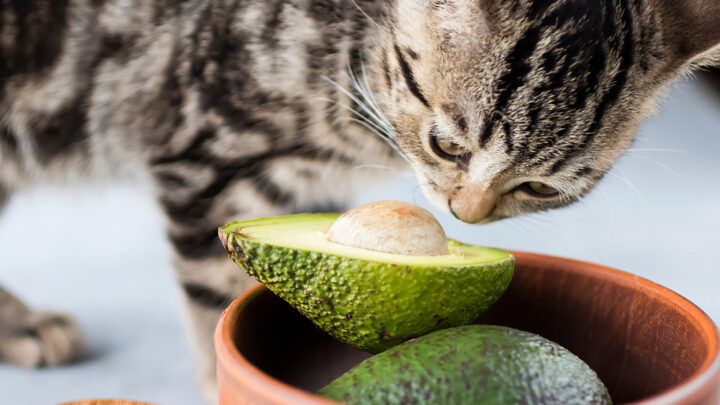In your salad, sliced on top of your breakfast toast, or mashed inside of your favorite guacamole – avocados make you want to scream “Oh my!” every time you see them. And, to nobody’s surprise, your feline friend’s catching on to the obsession. But, can cats eat avocado?
Your fridge has probably illuminated a leftover guacamole munching session on more than one occasion. And, your curious kitto has perked up her ears and flicked her whiskers, meowing and begging to let her have a taste more than that one time.
Who wouldn’t want to nibble on that creamy, gorgeously green content of a perfectly ripe avocado!? You can’t claim something that’s known as butter fruit, fertility fruit, and alligator pear doesn’t scream “Eat me because I’m the most delicious thing you’ll ever have the satisfaction of tasting!”
Trust me, your mischievous monster understands the power of avo on toast. That’s why she’s giving you that look every time she sees you secretly munching on something that might be an avocado. Come on, you know exactly what look we’re talking about!
What else are you supposed to do than share the alligator toast with her!? “Argh, now I have to hop online and check whether cats can eat avocado!” We’ve got your back, and boy, aren’t you lucky to have stumbled upon this article.
Our friends over at the ASPCA (American Society for the Prevention of Cruelty to Animals) don’t recommend feeding avocado to your cat. This pitted fruit contains persin, and trust me, you don’t want this toxin anywhere near your cat.
Can cats eat avocado?
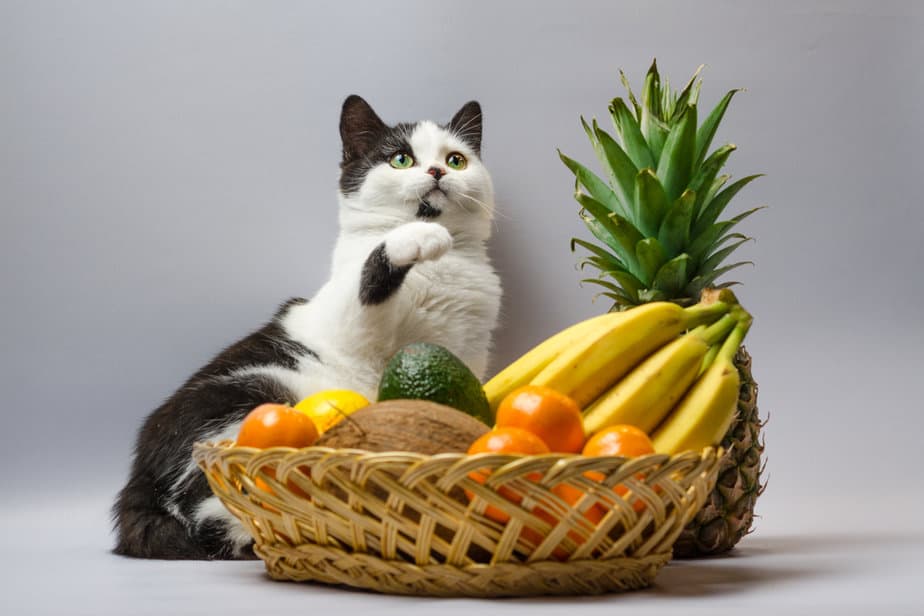
Cats can eat avocado, kind of… It can be quite a toughie when talking about the dos and don’ts of feeding avo to your precious purrincess. In short, she can nibble on a tiny tidbit of avocado flesh, but can’t and shouldn’t munch on the entire thing.
We can’t ignore the obvious questions, can we? Do avocados even belong in your cat’s diet? Do they even bring anything to your cat’s table?
As we know, cats are carnivores. On the off chance that you’ve been living under a rock, that means that they need animal-derived nutrients predominantly in their diets to survive and thrive. They don’t need fruits, veggies, and whole grains in their diets the same way humans do.
Cats don’t even possess the digestive enzymes necessary to break down and process most foods that humans eat every single day.
You can’t share your afternoon cookies and milk treats with your feline friend. She can’t drink milk because of lactose AND she can’t eat chocolate because of theobromine and caffeine. Besides, she can’t even taste sweet things because she doesn’t possess the sweetness receptors – she wouldn’t even like your cookies.
Circling back to the starting point of the article, avocados aren’t really a natural part of a cat’s diet. That’s not to say that your cat’s ancestors have never stumbled upon an avocado and stuffed their mouths.
But, that’s a testament to the fact that cats don’t need to eat avocados no matter how much they might want to. A little lick or a nibble shouldn’t cause harm to your cat’s health. But, it’s not worth the risk (more on that later in the article).
Dos of feeding avocado to your cat
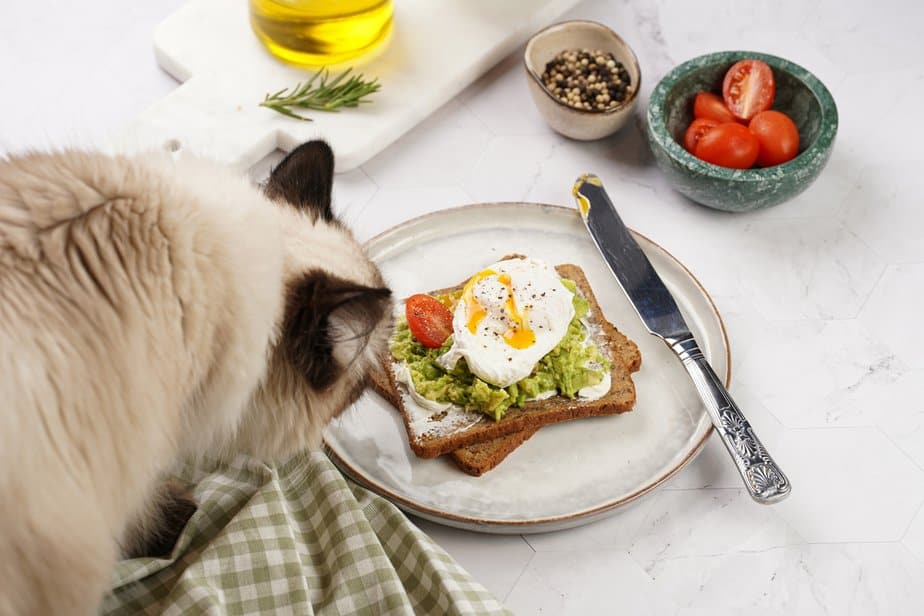
“What are we talking about here? Cats can AND can’t eat avocado? Wait, what!?” We understand how confusing it must be to read that your furry friend can enjoy a nibble or two of her favorite fruit, but… We can’t talk about cats and avocados without the dreaded but.
Cats should get most of their nutrients from carefully crafted cat foods, cat treats, and occasional meaty morsels. But, that’s not to say that an avocado (which can by no means be a regular part of a cat’s diet) can’t bring something positive to the table.
Trust me, not everything’s gloom and doom over the undying love your furry friend feels for the alligator pear. Consult with your vet, make sure you have your facts locked, loaded, and ready to go, and voilà. You and that furry thing on your lap have yourselves an afternoon treat.
1. Vitamins, minerals, and antioxidants
One of the main reasons humans consider avocado a chef’s kiss is that they’re stacked with vitamins, minerals, and antioxidants. Sure, humans love their avocado toast that’s worthy of an Instagram post and avocado salads that can get on the TikTok trending page in a matter of minutes.
But, they’re particularly happy with the fact that avocados provide them with an immune boost, maintain the function of their nervous system, and ensure digestive health. Vitamins K, E, C, folate, magnesium, potassium, riboflavin, and niacin!? Sign me up for that!
And, your mischievous monster can reap some of those benefits when she’s out and about, looking for trouble. An occasional nibble or two can improve her eyesight, muscular function, and cardiovascular health (vitamin E), help the production of collagen (vitamin C), and regulate a bunch of body functions (potassium).
And, don’t even get me started on the production of oxygen and the synthesis of DNA (folate), as well as the endless supply of energy (niacin). Who doesn’t want a hyperactive kitten that doesn’t know when to stop munching on avocado and scoffs down the entire thing before you can say “Avoca-DON’T!”?
2. Dietary fiber
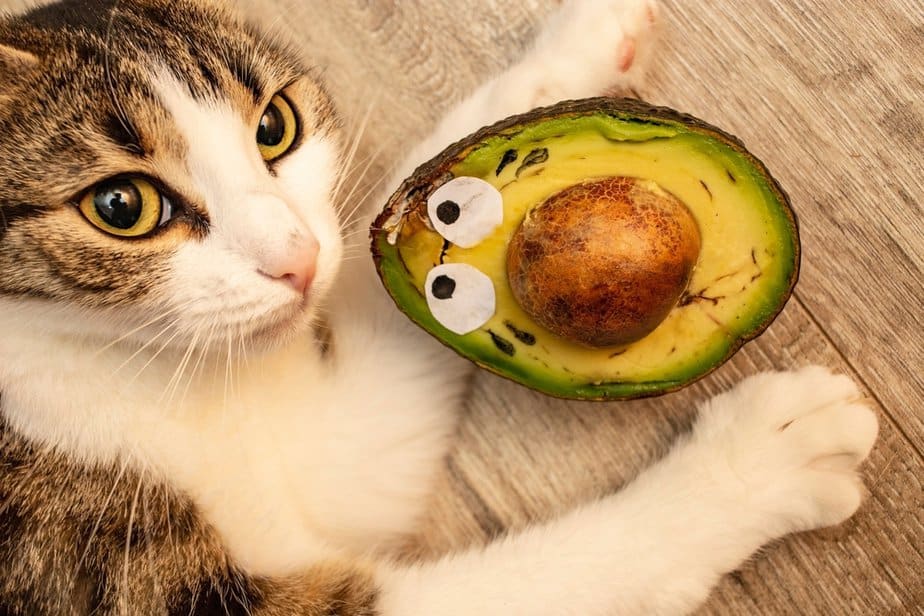
Oh boy, you wouldn’t want your precious purrincess living in the world without dietary fiber! You see, her ancestors used to get most of their fiber from the insides of their prey’s stomach and from a random plant they munched on while waiting for the unsuspecting rabbit.
Wild cats nibble on leaves and flowers while waiting for Bambi to get out of hiding (sniffles and apologies for putting that image inside your head). But, your not-so-wild cat munches on everything other than the things she should –or at least that’s what it seems like.
So, more times than not, she’s in desperate need of dietary fiber. She gets a little bit from her regular cat food and cat treats. But, dietary fiber plays such a huge role in her digestive system that she’s always looking for more.
Dietary fiber provides bulk to help food move through the digestive tract. Not only that, but it also retains water, which helps with digestive problems like diarrhea and constipation. That means less time spent in her litter box and more cuddling in your arms!
Don’ts of feeding avocado to your cat
But, as you might have suspected, avocados aren’t only rainbows and butterflies. Cats can’t eat avocado for a couple of good reasons, and we’re here to help you uncover them.
Your four-legged friend might have spent the day meowing and purring in solitude because something she ate yesterday made her sick to her stomach. You know what we’re talking about – nausea, vomiting, and diarrhea at the same time sound pretty rough for your little purrer.
Avocados can do that to her if she gets hold of a few bites before you catch her in the act. And, if you’re not consulting with your vet before you decide to capitulate and let her do whatever she wants. So, here’s what to expect when your cat eats an avocado (or the wrong part of one!)
1. The pitted poison
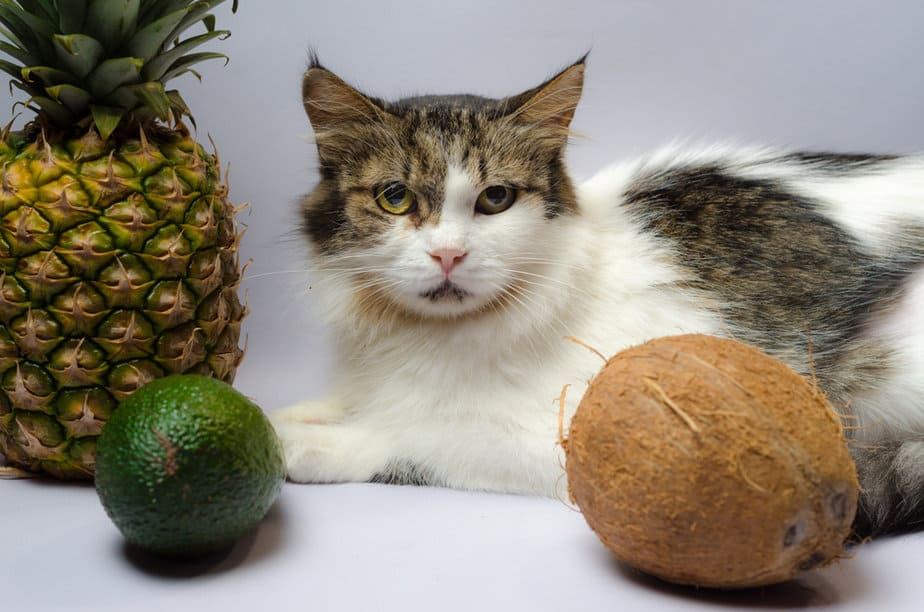
That’s right, one area of feline concern is an organic compound known as persin. Persin is typically found within the avocado pit, leaves, peel, and stem of the avocado fruit.
And, most importantly, cats can’t eat avocado because they can’t eat persin… Kind of.
Most reports say that humans, cats, and dogs can consume smaller doses of persin without experiencing the symptoms of persin poisoning. Actually, persin typically affects birds and larger animals that feed off the entire plant.
On the other hand, humans, cats, and dogs only eat the flesh that doesn’t contain as much of this compound.
So, what happens when your fluffy feline eats the wrong part of the avocado? She might experience digestive problems, including nausea, weakness, loss of appetite, to vomiting, diarrhea, and constipation.
Severe cases can even cause pancreatitis, which means inflammation and damage to the pancreas and surrounding tissue. You might not want to feed avocados to your cat at all after you finish reading this article, and that’s completely fine.
But, should your very purrsistent feline meow your ears off hoping to get a bite, make sure you remove everything that could harm her. Don’t forget that the pit and the peel can also become a choking hazard, so that’s another reason for you to remove them.
2. The hidden allergens
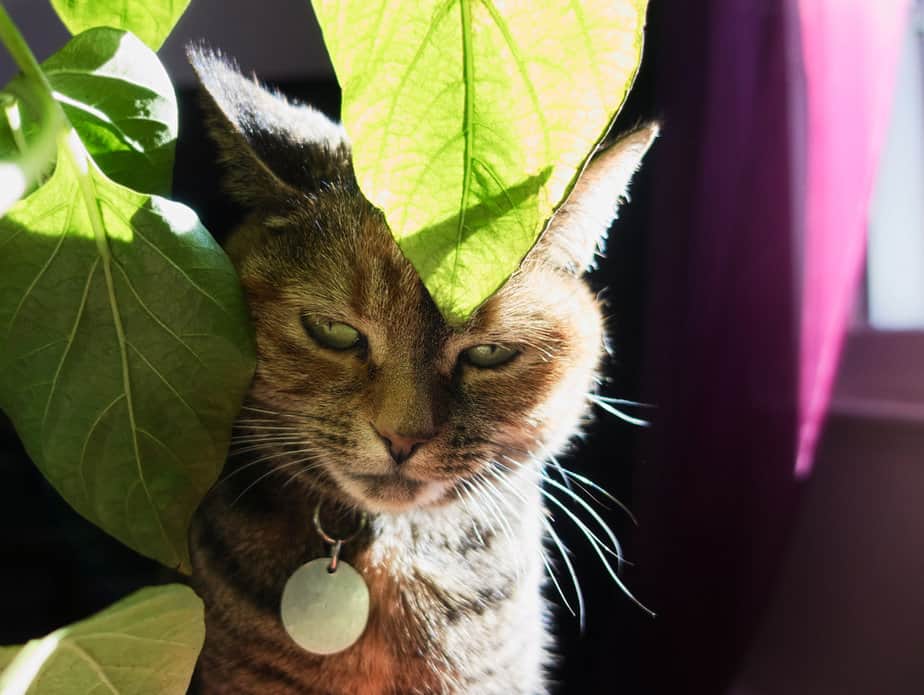
“Cats can be allergic to avocado, too?” That’s right, there’s another danger lurking around the corner while your fluffy friend’s munching on your leftover avocado toast. Cats can experience a bunch of severely unconformable symptoms should their human forget to check in with the vet.
While pretty uncommon, avocado allergies can occur among felines that are generally sensitive to fruits and veggies. Some of the most common symptoms screaming “she’s allergic, you dinghead!” are weakness, watery eyes, runny nose, skin irritations, rashes, hives, vomiting, and diarrhea.
Contact your vet the moment you notice any of them, and make sure you keep him up-to-date on what your feline friend’s been eating. Don’t worry, she’s going to be as good as new the moment she gets that avocado out of her system (lots and lots of pooping later).
3. The “healthy” fats
Yes, avocado’s beaming with healthy fats. Yes, avocado can help you lower your cholesterol levels because it’s packed with fatty acids. And no, cats can’t eat avocado because such high-fat levels can cause gastrointestinal distress, digestive problems, and even pancreatitis.
Not only that, but feeding avocado to your cat can lead to weight gain, obesity, and eventually heart failure. Avocados might be beaming with healthy fats, but they’re fats nonetheless. And your furry friend’s digestive system simply isn’t strong enough to keep those fats at bay.
Furry and chonky might sound like a match made in heaven, but that can’t be further from the truth. Overweight cats have a worse quality of life compared to cats that aren’t overweight. They can’t move around with ease, they’re depressed and weak, and they keep eating more… And more.
So, can cats eat avocado?
The consensus is: Cats can’t eat avocado! Avocado doesn’t seem to be worth the risk – this buttery fruit isn’t a natural part of a cat’s diet, can cause a host of digestive issues, and contains persin that can be poisonous.
Avoid giving your kitto avocado as far as possible, or if you must, only give your McFluffer a tiny nibble of the avocado flesh.
